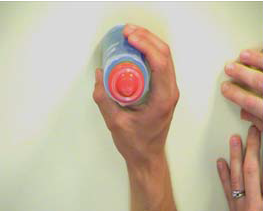AIM:
To train conjunct rotation of the thumb and little finger in preparation for manipulating objects
Rationale:
Two important components for manipulating objects are:
1. conjunct rotation of the thumb
2. conjunct rotation of the little finger.
Task-related training is set up so the patient can practice with manual guidance from the therapist if necessary.
Equipment:
- Table
- Chairs
- Cylindrical objects
Key Points:
-
- Patient is positioned in sitting, arm supported on table
- Therapist is positioned to the side of the patient and provides manual guidance at the hand if necessary
- Conjunct rotation of the thumb
-
- Patient holds a cylindrical object and rolls thumb down so the pad is in contact with the object
- It may be necessary to tape the cylinder into the hand if the patient is unable to grasp objects
- Ensure forearm remains in contact with the table
- Conjunct rotation of the little finger
- Patient places tips of thumb and little finger together (ie, opposition) and abducts little finger
Common Errors:
- Patient slides thumb up the cup (ie, extends the MCP jt of the thumb)
- Patient abducts and/or internally rotates shoulder
- Patient flexes the wrist
- Patient fails to maintain opposition of thumb and little finger when attempting conjunct rotation of the little finger
Progression and Variety:
- Decrease/remove manual guidance
- Remove support from table
- Sustain muscle contraction
- Increase circumference of object in hand

